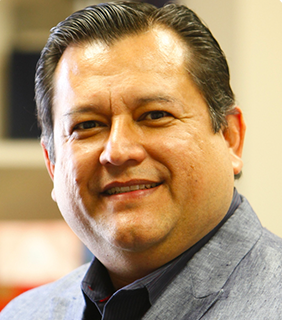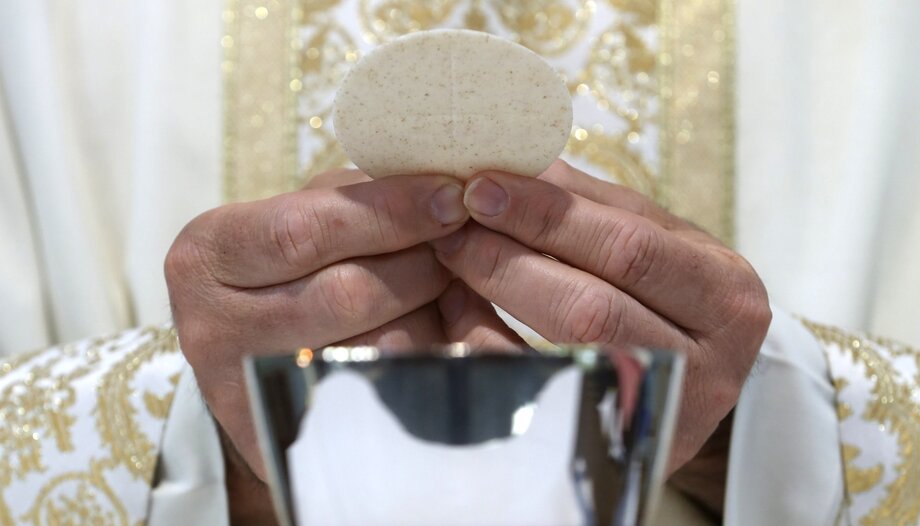
The start date of the National Eucharistic Congress is approaching. July 17, 2024 begins a few days of encounter between U.S. Catholics and Christ. The mood of the final preparations is in full swing, but members of the organizing teams still have time to talk about this great historic event.
One of those people who is eager to share what is happening to encourage people to participate in the National Eucharistic Congress is Jaime Reyna. Jaime is responsible for multiculturalism and inclusiveness, but he has a long history of involvement in Church activities. He has been director of the offices of Family Life, Youth Ministry, Social Ministry and Multicultural Ministry in the Diocese of Corpus Christi (Texas).
In this interview, Jaime Reyna talks about the organization of the Congress and the fruits he expects to see from this national gathering of Catholics.
What has been the most exciting thing about participating in the preparation of the National Eucharistic Congress?
– I worked for the Diocese of Corpus Christi for sixteen years and was a director for many of the offices and special projects for the Bishop. And then I got a call to apply for a position and my heart prior to that was longing for a change but I didn’t know what it was. When this invitation happened and this Congress and the job they were asking me to do seemed impossible, but that’s what I love because I think those are the moments when you can see the hand of God.
So it was an easy yes for me, because this new job had to do with the Eucharist, which I love, and the reason for this Congress moved me, I really wanted to put everything into this National gathering. It makes me really excited that I, a humble servant, get a small role to bring my gifts and talents to this.
Why was it important to take care of the Spanish resources for the Congress?
– Especially after being a Hispanic mission director for several years I noticed that the Hispanic community in particular are hungry but also have limitations sometimes, because there are not enough resources in Spanish. When I came on board, I knew we had to make an effort to provide as many Spanish resources as possible. We haven’t done the best job, but we are doing better than before. We are at a better stage but I have to say that we had a bumpy start.
Will Hispanics be able to find elements from Hispanic American countries in the Congress that will help them get closer to their roots?
– The challenge for this is space and schedule, but we will have two stages where people will get a chance to play and listen to traditional music. We are working really hard to make this event as diverse as possible.
We do feel like that people will also see some cultural ambience in the liturgy. We are having a Vietnamese Mass, and a Spanish one, and we are trying our hardest to let people in the Eucharistic procession wear their traditional attire.
What are you working on at the Congress to ensure that multiculturalism and inclusiveness are well integrated into the organization?
– I did several visits to the Indianapolis area to invite parishes that had a multicultural community to participate not only as attendees but also if any of them had gifts and talents that they could put to use, I asked them to collaborate with us. We want to create an ambience of cultural diversity, because that is the actual face of our Church.
We are also making an effort so that the disabled community will feel welcome and invited. Our brothers and sisters who are deaf or blind… We want everybody to feel welcomed.
You define the Congress as a "living encounter with Christ", what will this translate into concretely?
– First and foremost, not a lot of people get to come to a national gathering to come as one body, the Body of Christ. When it comes to parish or diocese life, people see the world basically from their areas and to experience other catholics from different cultural backgrounds it’s going to live up their encounters with Christ among each other. Our diversity unites us as one faith, and to be able to share that is beautiful.
What would you like the participants of this experience to take home with them?
– That is one of the things that the team is working on. We don’t want people to feel like they go to the Congress and that’s the end. The Congress is actually a beginning, we are trying to let everyone know that as we come together, as we renew ourselves, we can go back to our communities and share the fire of the revival of this new encounter with Christ. We are called as Eucharistic missionaries and disciples to take what we learn and experience and share it with others.
What would you like to tell people to encourage them to participate in the National Eucharistic Congress?
– I would encourage them to look at it this way: this is a historic moment. We hadn’t had a National Eucharistic Congress in 83 years. Number two, when we talk about the National Eucharistic Pilgrimage, you just have to know that it is the first time in our history that something like this takes place. That in itself is also an opportunity.
But if anyone has ever had a moment of doubt about participating in the Congress, I want to tell them that our Bishops, guided by the Holy Spirit, voted to make this happen before even knowing the budget. They knew this was necessary, that our Church needed it. And we, as lay people, need to respond to this call. If many of us come together united in the same cause and faith, we will be witnessing to the world our faith and love for Christ.
I think this Congress is the best investment in a spiritual level that we can make.
You have been a member of a Nocturnal Adoration team for a long time, why do you think it is important to spend time praying before the Blessed Sacrament?
– When I’m with Jesus, everything becomes clear. Even in those times when I struggle, I just go to the Blessed Sacrament and I know that, whether I have an answer or not, He’s accompanying me.
Being part of the Nocturnal Adoration takes me back to the disciples praying with Jesus back then, and it is an honor to take even an hour of the shift to be able to pray for everyone in the world, for our Church, the vocations, those who are dying…
The more I do this, the more I love it. It feels like a part of me.







